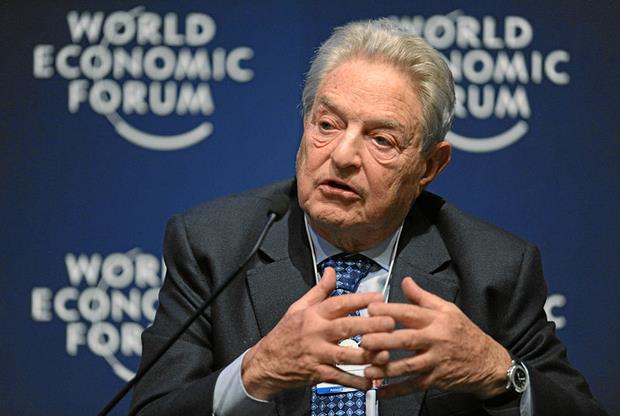In his latest interview for Sputnik Radio International, Srdja Trifkovic discusses an unusually revealing performance by George Soros at the World Economic Forum in Davos, Switzerland. [You can listen to the interview here.]
Sputnik: George Soros has launched an attack on China’s President Xi Jinping in his speech at the WEF in Davos, saying that artificial intelligence and machine learning presented “unprecedented danger” and “a mortal threat to open societies” if used by authoritarian regimes. He has urged Washington to crack down on Chinese technology companies and said that President Xi’s Belt and Road investment plan was designed to promote only the interests of China. Soros has also warned that the US and China are locked in a cold war that could soon turn into a hot one. He said that President Trump’s decision to call China a “strategic competitor” was “too simplistic,” adding that Trump was making concessions to China while renewing his attacks on allies . . . Chinese Foreign Ministry spokeswoman Hua Chunying said on Friday that Soros’ statement does not even deserve to be refuted. Sputnik discussed Soros’ speech with Srdja Trifkovic, foreign affairs editor for Chronicles magazine. Is there a valid point about the danger of machine learning and artificial intelligence to democratic governments from one-party China?
ST: Whatever point George Soros makes, you can bet your life that he has an ulterior motive and a hidden agenda. We are looking at a man who has financed, consistently and over many years, some of the most anti-democratic projects you can imagine. This includes facilitating migration into Europe of millions of denizens of the Third World, regardless of whether the Europeans want it or not, and advocating the imposition of taxes to pay for it.
Soros is primarily an enemy not so much of the opponents of what he calls “open society,” but of the concept of national sovereignty in its traditional, Westphalian form. He is also an opponent of multipolarization of the world. He wants an open-ended continuation of the American global empire. That is why he was so opposed to Trump. He feared the skepticism which candidate Trump expressed, three years ago, about the continued utility of NATO after the end of the Cold War. As for “Make America Great Again,” it was primarily a call to return home from global commitments, which Soros loathed.
George Soros sees in China – also in Russia, and he has criticized President Putin savagely in the past – one of the prime upholders of the traditional concept of national sovereignty and a backer of the kind of multipolar world that he abhors. So I am not surprised by this remarkable outburst of his, including calls for de facto economic warfare, which is at odds with his self-proclaimed preference for free trade. As for his stated opposition to the Belt and Road Initiative on the grounds that it is in the interest of China – but of course it is, as well as in the interest of other countries which join it. It’s the sort of give-and-take approach which is the basis of transactional diplomacy and international economic relations.
We are looking at a man who wants to revolutionize the world in accordance with his weird image of what this “open society” should be: without borders, without national cultures, and without national communities based on collective memories, on emotional and cultural solidarity—a melange of nations, races and languages in which it would be so much easier for the plutocrats like himself to rule over everybody else.
Sputnik: You’ve described George Soros’ ideology very well to our listeners, thank you very much. Is there anything you can say in justification of his criticism of Chinese President Xi Jinping?
ST: I’d say whatever initiatives China is taking in the field of surveillance has already been tried in the West and to some extent is being applied, although this is not being widely advertised the way it is in China. In fact what Soros is advocating is a form of velvet-gloved totalitarianism in which the “deviants” who are skeptical about the desirability of open borders, say, will be simply excluded from society and not necessarily incarcerated. In some aspects one may look askance at the Chinese program of internal surveillance. Yet it is only more explicit, more overt, one might even say more honest form of surveillance than the one prevalent in many parts of the Western world with its more subtle but not any less effective forms of control . . .
With Soros, what is always present, year after year, event after event, is an attack on—one—the survival and continuation of national coherence based on collective memory and internal solidarity of a group that shares genetic, linguistic and cultural traits; two—sovereignty as manifested, first and foremost, in the control of national borders and in the right [of sovereign power] to decide who can reside inside a country; and—three —the notion that a country, any country, belongs to the people whose ancestors had built it, fought for it, and died for it . . .

Leave a Reply